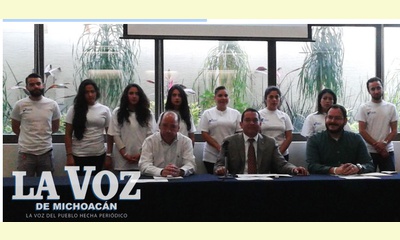|
|
CEDH [State Human Rights Commission] and the Government have signed the Manifesto for a Culture of Peace and Non-Violence [Michoacan, Mexico]
un articulo por Verónica Torres, La Voz de Michoacán
If each person in his/her own community promotes a culture of
peace and non-violence, it will combat the violence that affects all
members of the society. 
click on photo to enlarge
During the reading and signing of the Manifesto for a Culture of
Peace and Non Violence, Secretary of the State Government Jaime
Mendez Dario Oseguera said that this manifesto will strengthen the
values that help to improve the solidarity of the community.
He emphasized that there are diverse values that unite the
community for human rights and its related principles, to promote
actions taken by the CEDH [State Human Rights Commission],
especially when the community has been threatened by violence. It
is alarming, he said, that the violence that exists today has no
ideologies and takes place outside the law.
For his part, the president of the CEDH, Jose Maria Cazares
Solorzano said that the manifesto will strengthen their actions in
Michoacan.
As an overview, the Master Germán Martínez Ramos considered in
detail the areas of action for the actors at local, national and
international level, those that should promote a culture of peace
through education, sustainable economic and social development
by reducing economic and social inequalities, respect for all human
rights, democratic participation, etc.
Following which, the Michoacan Ombudsman, Jose Maria Cazares
Solorzano, took the pledge of the Manifesto, promising to respect
all life, reject violence, release my generosity, listen to understand,
preserve the planet and rediscover solidarity, to which the State
Government agreed.
(Click here for a Spanish version of this article)
|








|
DISCUSSION
Pregunta(s) relacionada(s) al artículo :
The Manifesto 2000, Is it still relevant today?
* * * * *
Comentario más reciente:
:
The Manifesto 2000 was signed by 75 million people during the International Year for the Culture of Peace (2000), who promised to promote a culture of peace in their daily lives. Specifically, they promised to:
Respect the life and dignity of each human being without discrimination or prejudice;
Practise active non-violence, rejecting violence in all its forms: physical, sexual, psychological, economical and social, in particular towards the most deprived and vulnerable such as children and adolescents;
Share my time and material resources in a spirit of generosity to put an end to exclusion, injustice and political and economic oppression;
Defend freedom of expression and cultural diversity, giving preference always to dialogue and listening without engaging in fanaticism, defamation and the rejection of others;
Promote consumer behaviour that is responsible and development practices that respect all forms of life and preserve the balance of nature on the planet;
Contribute to the development of my community, with the full participation of women and respect for democratic principles, in order to create together new forms of solidarity;
It would appear that the Manifesto is now considered to be very relevant to the situation in Mexico. At the same time as the Manifesto was signed in the Michoacan state of Mexico, it was also presented in the Mexican state of Zacatecas.

|
|









